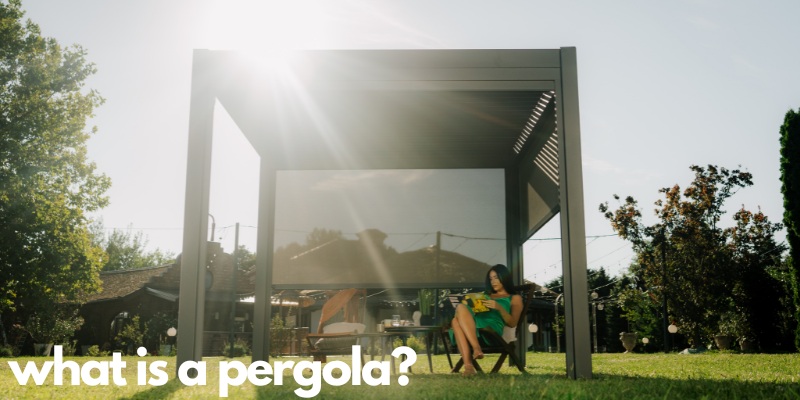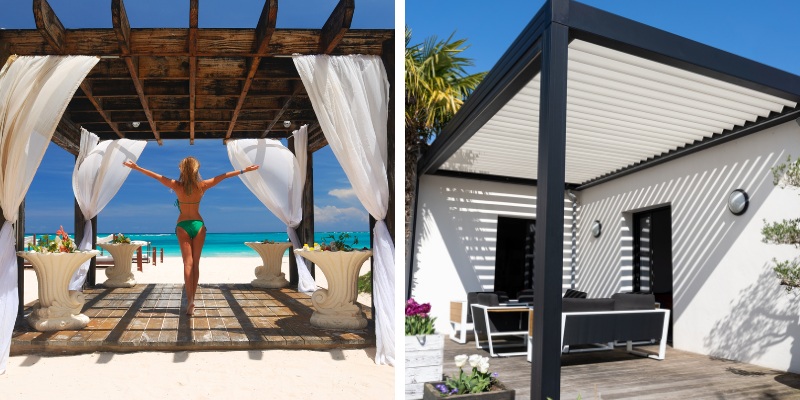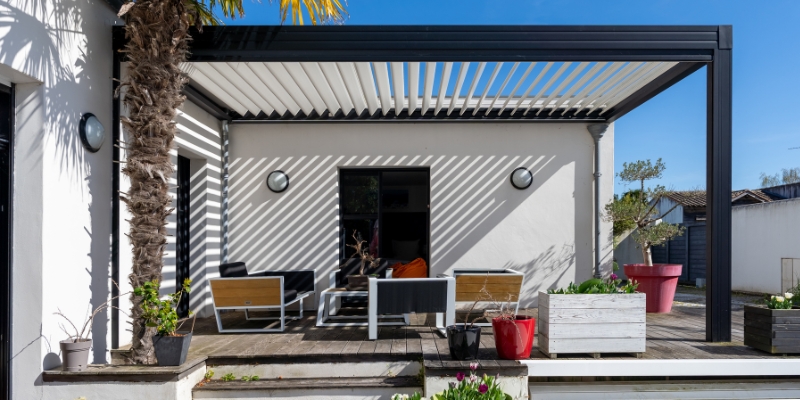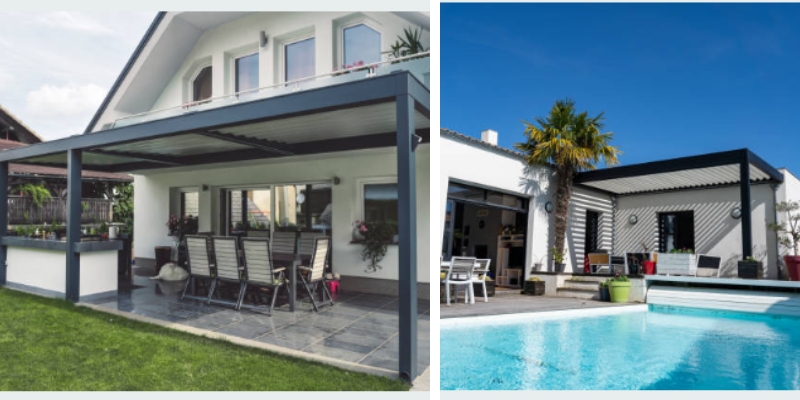
A pergola, within its core identity, emerges as a multifaceted outdoor structure, frequently fashioned from either wood or aluminum, thoughtfully engineered to offer shade and augment the quality of open-air living environments.
However, what precisely distinguishes it from alternative outdoor structures? How does it seamlessly intertwine with climbing plants, suspended greenery, and even alfresco outdoor furniture to orchestrate a coherent outdoor haven?
As we journey through this piece, you’ll discover not just the definition of the word “pergola,” but also its functional and aesthetic role in transforming backyards, gardens, and patios.
So what is a pergola?
Where Do Pergolas Originate?
From pharaohs to Roman patricians, pergolas have long been a mainstay in outdoor architecture.
The word itself hails from the Latin word “pergula”, which refers to a projecting eave. But don’t let the classical etymology fool you into thinking it’s a thing of the past.
Ancient Egyptians were among the first to utilize pergolas in their gardens, valuing them for the shade they offered in a sun-drenched environment. Fast forward a bit, and you’ll find Romans then Italians during the Renaissance era embellishing their grand gardens and courtyards with these structures.
What Is A Pergola, Technically?
A pergola is an open-air structure consisting of vertical posts supporting beams that are usually at right angles to each other. These beams or louvers form an open lattice or cross-beam pattern, often made of wood or aluminum, which distinguishes pergolas from other outdoor structures.
Unlike gazebos and other similar structures, pergolas don’t offer full coverage from the elements. Instead, their primary function is to provide a framework for vining or hanging plants or to create versatile shade in your outdoor living spaces.
What Does A Pergola Do?
Functional Benefits
1. Shade and Sun Protection
One of the standout functional benefits of a pergola is its ability to provide shade and sun protection. You might be asking, how effective is a pergola in blocking out the sun?
The answer depends on its structure. Pergolas with a louvered design offer partial shade, allowing just enough sunlight to filter through while giving you a reprieve from direct exposure.
Nevertheless, should your quest entail a quest for greater adaptability, contemporary aluminum pergolas, equipped with adjustable louvers, may pique your interest. These not only bestow a refined elegance upon your outdoor domain but also confer upon you unmitigated authority over sunlight.
2. Extended Living Space
A pergola also serves as an extension of your home, carving out a dedicated space for dining, relaxation, or even an outdoor kitchen. Imagine cozying up with a book in the open air or hosting a dinner under the stars.
No more worrying about the availability of space when your backyard becomes your new favorite room. And for those who prize versatility, modern aluminum pergolas can adapt to your needs, be it more shade or openness, offering an ever-changing but always inviting setting.
3. Plant Support
A pergola also acts as a robust support system for various plants. Be it climbing roses, wisteria, or even grapevines; these structures offer the ideal framework for vining plants to flourish.
4. Carport Utility
This functional benefit is often overlooked. It is the use of a pergola as a carport. Particularly in areas where homeowners need protection for their vehicles from elements like the sun or occasional rain but don’t necessarily want a fully enclosed garage, a pergola serves as an ideal solution.
This outdoor structure allows for adequate ventilation, ensuring the car doesn’t become too hot in the summer. For those seeking more protection, a louvered aluminum pergola can be adjusted to shield vehicles from direct sunlight or precipitation, while still maintaining the elegance and open feel of the structure.
Aesthetic Benefits
1. Architectural Interest
After discussing the functional benefits, it’s impossible to overlook the sheer architectural allure that a pergola brings to your outdoor space. With its distinctive geometric roof covers available now and even with its open framework, a pergola is more than just a functional structure; it’s an architectural masterpiece that instantly elevates the aesthetic value of your yard or garden.
Whether it’s an intricate wooden design or a sleek, modern aluminum pergola, the architectural interest it adds is undeniable.
2. Style and Customization
Building on the architectural interest a pergola offers, another aesthetic advantage lies in its flexibility for style and customization. Whether you’re a fan of rustic charm or lean towards minimalist designs, a pergola can be tailored to fit your personal aesthetic.
From the choice of materials—ranging from classic wood to modern aluminum—to the type of cross beams and roofing grid, you have the freedom to customize each element.
The variety doesn’t stop at structure; the color scheme, hanging plants, and even the type of shade provided can be tailored to your exact specifications. The ease of customization is especially notable with modern aluminum pergolas, which offer sleek designs that can be easily adapted to any outdoor color scheme or decor and numerous customization options.
3. Curb Appeal
Another undeniable aesthetic benefit of having a pergola structure is the enhanced curb appeal it adds to your home. This isn’t just an asset for your own enjoyment; it’s also an investment that can increase the value of your property.
Whether freestanding in the garden or attached to the house, a well-designed pergola draws the eye and beckons visitors into your outdoor living space.
Especially when complemented with pergola decorations and climbing or hanging plants, a pergola becomes a living feature that evolves seasonally, continually renewing its visual interest.
Which Pergola Is Better?

After discussing the myriad of functional and aesthetic benefits that pergolas bring, you might be wondering which type of pergola is the best fit for you. The answer largely depends on your needs, aesthetic preferences, and budget.
When considering pergola cost, wooden pergolas tend to be more expensive due to the cost of lumber and required maintenance like staining or sealing in the long run. On the other hand, vinyl pergolas offer an affordable beauty that is easy to maintain.
If you opt for a louvered aluminum pergola, you not only get a highly functional space but also a modern design statement that brings a touch of sophistication to your outdoor living area with minimal maintenance and upkeep.
Conclusion
In a nutshell, a pergola is not just a structure; it’s a versatile addition that enhances both the function and aesthetics of your outdoor spaces.
Bestowing both shade and sun protection and concurrently functioning as an architectural element, pergolas proffer an extensive array of advantages. Whether your preference veers toward a wooden pergola, intended to nurture your climbing flora, or gravitates toward an aluminum framework, known for its sleek design, low maintenance, and durability, the judicious selection of a pergola stands poised to lift your backyard expanse into a realm of elevated magnificence.
Pergola cost varies, but with options ranging from free pergola DIY projects to ready-to-assemble pergola kits to sophisticated aluminum structures with higher initial investment, there’s an option for every budget.
So, if you’re looking to change your outdoor experience and want to spend more time outdoors, adding a pergola could be the perfect next step.


